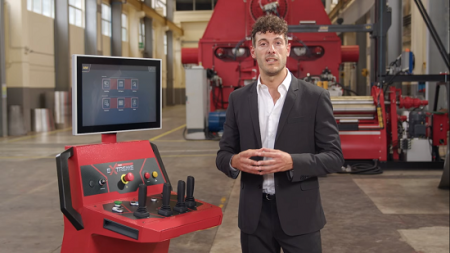Chinese state-owned auto producer Chery Automobile will build an electric vehicle (EV) factory in Thailand after more than two years of discussions with Thailand’s Board of Investment (BOI), which has secured multiple other EV-related investments.
Manufacturing Activity In ASEAN Ends Two-Month Contraction In November
Southeast Asia’s manufacturing sector stabilised in November for the first time in three months as output picked up despite sluggish demand from abroad, according to the latest survey by S&P Global.
China’s Electronics Manufacturing Scene Sees Closures
Several businesses involved in the local supply chain for electronics parts and other devices have suffered factory closures and layoffs in southern and eastern China, industry sources revealed. Such is a glaring indication of shifts in manufacturing preferences affected by socio-economic and geopolitical tensions.
DAVI iRoll eXtreme: The New Frontier Of Control System
DAVI’s unique, appealing and futuristic-looking console is designed and optimised for 24/7 operations.
ABB To Build Highly Advanced Robotics Factory In China
ABB has announced a major, new US$150 million investment in Shanghai, China where the company will build an advanced, automated and flexible robotics factory that is expected to be operational by 2020. A cutting-edge center where robots make robots, the new Kangqiao manufacturing center will be located close to ABB’s expansive China robotics campus and aims to combine the company’s connected digital technologies, including ABB Ability solutions, collaborative robotics and innovative artificial intelligence research to create a “factory of the future.”
In 2017, one of every three robots sold in the world went to China, which purchased nearly 138,000 units and is recognised as the world’s largest robotics market. ABB’s CEO, Ulrich Spiesshofer, and the Mayor of Shanghai, Ying Yong, have also signed a comprehensive strategic cooperation agreement focused on supporting industry, energy, transport and infrastructure developments in the region, as well as to support the “Made in Shanghai” manufacturing initiative.
“China’s commitment to transform its manufacturing is a torchlight for the rest of the world,” said Spiesshofer. “Its strategic embrace of the latest technologies for artificial intelligence, advanced robotics and cloud-based computing present a playbook for every country that wishes to have a globally competitive manufacturing base. Shanghai has become a vital center for advanced technology leadership – for ABB and the world. We look forward to working with Shanghai Mayor Ying Yong, other community leaders and our customers as we launch this major expansion of ABB’s substantial presence in China, building on our journey to become China’s leading Robotics manufacturer that started in Shanghai over two decades ago.”
Leading The Way With a Digital Factory Of The Future – Tailored Solutions And Better Performance
The new Shanghai factory will feature a number of machine learning, digital and collaborative solutions to make it the most advanced, automated and flexible factory in the robotics industry, while an onsite R&D centre will help accelerate innovations in artificial intelligence. Using a new, global design approach that ABB announced earlier this year, the factory will be able to dramatically increase both the breadth (type of robots) and depth (variants of each type) of robots that can be made onsite, allowing for an enhanced and accelerated customisation process to meet the needs of customers.
ABB will also be able to combine this expanded portfolio of robotics into an almost limitless number of tailored solutions. “The concept behind this factory is the same advice we give our customers every day: invest in automation solutions that provide flexibility and agility to grow in whichever direction the market goes,” said Sami Atiya, President of ABB’s Robotics and Motion division. “ABB is proud to help our customers in China and around the world with solutions that take full advantage of the latest technologies to meet the challenges of mass customisation, faster cycles and constant change which have become the new normal – even in our own factories.”
The entire Shanghai factory will be modeled as a digital twin, which will provide intuitively tailored dashboards for management, engineers, operators and maintenance experts to make the best decisions. This includes gathering and analysing intelligence on the health and performance of robots within the factory to ensure early identification of potential anomalies. In addition to avoiding costly downtime, ABB Ability offers advanced digital solutions that can improve performance, reliability and energy usage, as well as provide access to cloud platforms, such as the Microsoft Azure enterprise cloud, which is also the first international public cloud service operated in China.
An Innovative Design That Makes Better Use Of Manufacturing Space
The new factory will have an innovative, flexible floorplan based on interlinked islands of automation rather than fixed assembly lines. The company’s logistics automation solutions will a;so be used throughout the plant, including automatic guided vehicles that can autonomously follow robots as they move through production, supplying them with parts from localised stations. This will allow production to adapt and scale efficiently to changes in China’s robot market without additional capacity expansions.
Per Vegard Nerseth, Managing Director of ABB’s Robotics business, said “There’s a large shift away from looking at factory size and CAPEX investments as the way to meet future demand. The concept behind our new factory is to make the smartest and most flexible use of every metre of production. That comes from combining agile automation solutions with the great capabilities of our people.”
To aid the move to mass customisation in manufacturing and to ensure the highest levels of productivity and flexibility, the new Shanghai factory will make extensive use of ABB’s SafeMove2 software, which allows people and robots to work safely in close proximity. In addition, the company’s YuMi robots will allow for close collaboration on many of the small parts assembly tasks needed to manufacture an ABB robot.
ABB was an early entrant in the China robotics market and the first global robot supplier in the country to have a complete local value chain, including R&D, manufacturing, system integration and service. Through close customer collaborations, ABB has helped introduce many “firsts” to local manufacturing including:
China’s first automotive press, welding and painting lines; the first assembly line for mobile phones; and the first automated press line for white goods.
“2018 marks the 40th anniversary of China’s reform and opening- up policy,” said Dr. Chunyuan Gu, Chairman of ABB China and President, AMEA region. “ABB was an early arriver in China and we now have a fully localised value chain, supported by China’s remarkable economic and social development. As the market leader in China’s robotics industry, we are glad to build on this success and continue our investment momentum.”
The new Shanghai factory – with a comprehensive R&D centre onsite – will become a key part of ABB’s global robotics supply system, together with the company’s recently upgraded factory in Västerås, Sweden and its factory in Auburn Hills, Michigan, where ABB remains the only global robot supplier with a US manufacturing footprint.
WANT MORE INSIDER NEWS? SUBSCRIBE TO OUR DIGITAL MAGAZINE NOW!
EuroBLECH 2018: Trumpf Showcases Autonomous Factory And Logistical Innovations
GERMANY: Trumpf will be showcasing numerous solutions for autonomous factories at EuroBLECH 2018 in Hannover. The company is set to present a range of digitally connected applications for sheet metal processing that are designed to make manufacturing processes simpler and more efficient. “As they become increasingly autonomous, our machines are taking on more tasks and making life easier for the people who work with them. But you can only unlock these benefits with a connected, intelligent production environment. That’s what enables us to achieve productivity gains and secure our customers’ competitive edge – and artificial intelligence is the key,” says Heinz-Jürgen Prokop, Chief Executive Officer Machine Tools at Trumpf. Prokop notes that there is now little to be gained by striving for ever higher laser power. Instead, the focus should be on connected machines and the processes that occur upstream and downstream from the actual production process. Combined with intelligent data analysis, he argues that this is where the biggest productivity gains can be achieved.
Assistance Systems Makes Processes More Reliable
Trumpf has already laid the foundations for the autonomous factory by including numerous assistance systems in its machines. One example that makes cutting processes more reliable is Smart Collision Prevention. This function’s programming already takes account of tilting parts and then develops a processing strategy in its calculations to avoid collisions with the cutting head. More and more machine functions now control processes autonomously. One example is Smart Nozzle Automation, a function that periodically inspects the nozzle and automatically replaces it if it is damaged. And that’s not the only milestone on the path toward autonomous laser cutting that Trumpf is showcasing at this year’s EuroBLECH in Hannover.
Self-Learning Machines
The fully automatic TruLaser Center 7030 laser system takes the whole concept of autonomous machines to the next level. From programming to part sorting, everything it does is completely automated. “We’ve already started using intelligent data analysis to improve the processes executed by this machine. By incorporating customer feedback in the form of data, our aim is to steadily perfect the entire system. Artificial intelligence is the next stage of Industry 4.0,” says Thomas Schneider, who heads up machine tool development at Trumpf. A good example is the machine’s unloading unit. The pins that lift the sheet out of the scrap skeleton are designed to ensure efficient and reliable part removal using suction cups. If the pins fail to get it right the first time around, the machine initiates a new part removal cycle on its own, without requiring any intervention. It then repeats this cycle as many times as necessary until it works. The machine processes and assimilates each of these retry attempts and learns from them.
Smart Factory, Intelligent Logistics
Trumpf will also be presenting a connected intra-logistics solution at EuroBLECH, something that Trumpf has already tested successfully at its Industry 4.0 showcase factory and at selected customer locations. The solution improves the logistics processes that run on the shop floor, for example the routing of parts from one processing station to the next. “Customers participating in our product testing program have sometimes made five-figure savings by deploying our indoor localisation system,” said Schneider. “It enables them to reduce search times and prioritise jobs in an intelligent fashion.” This is steadily becoming more important because batch sizes are shrinking and sheet metal fabricators are increasingly struggling to keep track of jobs throughout the entire production process. At the same time, the sheet metal fabricators’ customers want to know what stage their order has reached, which is a level of transparency they have come to expect from doing business online. The indoor localisation system enables customers to manage their production processes more efficiently and satisfy their own customers’ expectations.
WANT MORE INSIDER NEWS? SUBSCRIBE TO OUR DIGITAL MAGAZINE NOW!







